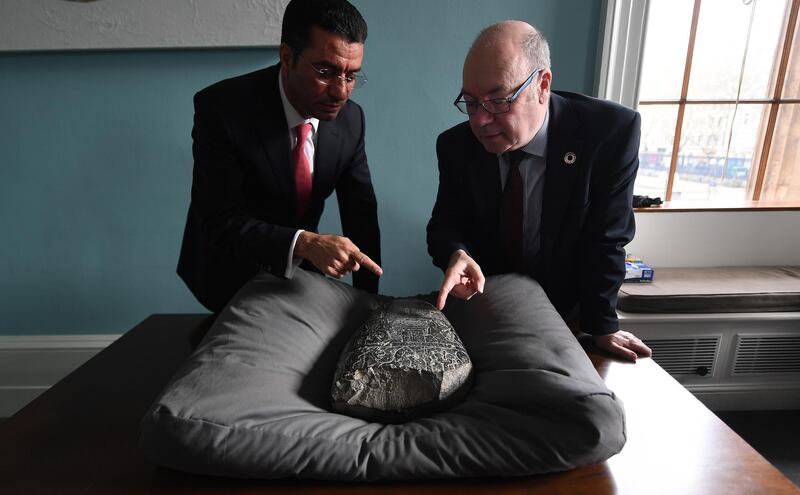Tributes were paid across British politics on Tuesday to the work of the UK minister for the Middle East Alistair Burt, who resigned overnight, as the country's Brexit crisis saw parliament wrest control of the process from Downing St.
Mr Burt served in the Middle East portfolio over five years during two stints after the Conservatives returned to power in 2010. A solicitor by training Mr Burt built up a deep knowledge and strong set of personal relationships throughout the region. He was particularly diligent about travel to the Middle East and attendance at diplomatic functions in London.
Statement on my resignation from Government last night: https://t.co/5ZXE8bRcOb
— Rt Hon Alistair Burt (@AlistairBurtUK) March 26, 2019
While the fortunes of the region animated him in private and in public, Mr Burt was also deeply exercised by the prospect of Britain leaving the EU in discord as a result of the 2016 referendum. In a letter to Theresa May after voting against the government in the Commons on Monday night, he said he quit to fight against his colleagues who were pushing for no-deal.
"This has put at risk something in which I firmly believe that, following the Referendum result, the best way forward for our nation is to leave the EU, but leave it well with an agreement about our future," he said.
In a rare outbreak of cross-party agreement, Mr Burt was praised across the Commons on Tuesday. "We applaud him for his principled decision," said Emily Thornberry, the Labour foreign affairs spokesman. "We will also miss both the substance and the tone the minister has brought to the debate over the last two years."
Andrew Mitchell, a former Conservative development secretary who had disagreed with Mr Burt and the government policy on Yemen, was another who said he would not easily be replaced.
"I've worked with him on matters of international development for the last 14 years and the government can ill-afford to lose such a capable minister at a time like this," he said.
Chris Doyle of the Council for Arab-British Understanding said it was the combination of experience with hard work that marked Mr Burt out.
"As the Foreign Office Minister with responsibility for the Middle East he brought a rare level of experience and understanding of the region" he said. "Frequently Ministers in this role have to learn on the job, which may be the case with his successor. Burt also made huge efforts to try to reach out to all sides on vexed issues such as Israel-Palestine. "Diplomatically he was also extremely active partially because he truly loved the role. He would invariably turn up to National Days in London, something not all his predecessors did. Moreover, he believed in getting out to the region and did so on a frequent basis."
Mr Burt's tenure coincided however with tensions and confusion over policy in the region and the rise of intractable conflicts involving regional and external powers.
"British foreign policy regarding the Middle East is still all over the place," Mr Doyle added. " It barely has a policy on Syria, is not even handed on Israel-Palestine, failed to back accountability on Gaza and is under scrutiny regarding its failure to get the Stockholm process working in Yemen.
"Burt ultimately was just a minister and the high-level decisions were taken elsewhere."
The loss of @AlistairBurtUK will be a major loss for @foreignoffice. His experience and friendships across the Middle East and calm command of the detail is unparalleled. His integrity is second to none. I’m sorry to see him go.
— Tom Tugendhat (@TomTugendhat) March 26, 2019
Mr Burt's immediate concern will centre on votes in parliament on Wednesday to set the direction Brexit after the embattled Mrs May failed to get her way.
The power to express their own preferences for a range of alternatives has not been seized by MPs in recent times and Mrs May said it set an "unwelcome precedent"
The options are likely to include a closer relationship with the EU, a second referendum and a command to revoke Article 50, the mechanism for the formal exit from the EU. ,
The government was defeated by 329 to 302, a figure that was bolstered by 30 Conservative rebels, including Mr Burt.






